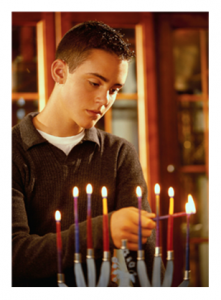For those who attend church and look forward to Christmas services, is this season about religion or tradition?
 For those who light their candles Friday nights and manage the menorah during Chanukah – is this an exercise in faith, or honoring heritage, particularly if there are children in the house?
For those who light their candles Friday nights and manage the menorah during Chanukah – is this an exercise in faith, or honoring heritage, particularly if there are children in the house?
And what about those who celebrate Kwanzaa, a relatively recent expression of the holiday season in the U.S. and Canada, created in 1966?*
When we have children, are we more likely to celebrate any holidays that pop up on the calendar – blending the secular and the religious – from shamrocks on Saint Paddy’s Day to egg hunts on Easter?
And what about our gods? Must they be part of the December holidays?
The New York Times offers a thoughtful dialog between two journalists who specifically address this issue from a parenting perspective. And let’s be honest. Religion is a minefield in this country; we have only to recall our recent national elections and the furor over the absence of the word “God” in the democratic platform – hastily reinserted after the fact.
In Room for Debate’s “Holidays Without God,” Times columnist Bruce Feiler squares off on the subject with Times Motherlode editor, K. J. Dell’Antonia. The former is Jewish, married to a Jewish woman. The latter comes from a Catholic background, her husband a Jewish one, and as she writes:
We’re just not a religious household… we celebrate Hanukkah this week, and Christmas after that… We light the menorah and eat latkes, and we put up a tree, bake cookies, and welcome Santa Claus, and that’s about it.
Mr. Feiler on the other hand explains his family’s celebrations:
I’m a Jew married to a Jew; our daughters went to Jewish preschool… I’m all for interfaith marriages, as contradictory as that may seem. They’re living laboratories of coexistence that model behavior the rest of us are still trying to figure out…
What troubles me about the holidays is not unique to interfaith families… It’s the idea that since parents are uncomfortable talking about religion, spirituality and God, we leave it out of the holiday all together.
Personally, I adore the holidays: I love decorating for it (preferably, not over-the-top); I love the traditions created with my sons which are silly and much cherished; I love the spirit of the season – a desire to give and to reach out to family – were activated on a more regular basis in a culture that accords these priorities the bum’s rush eleven months of the year.
I am not uncomfortable talking about religion. However, I was raised with the approach that faith is personal and private; individuals should be circumspect in what they say and how they say it; we are free to choose our variations on God or none at all.
What is important is how we lead our lives.
 I recognize that my beliefs are a bit of this and a bit of that – everything but the kitchen sink is not entirely off base.
I recognize that my beliefs are a bit of this and a bit of that – everything but the kitchen sink is not entirely off base.
As I was in an interfaith marriage – my ex-husband was a long-lapsed Catholic and subsequent atheist – our children were raised in my faith, with an openness to other traditions and beliefs. We feted more in the manner of Ms. Dell’Antonia than Mr. Feiler; Chanukah and Christmas in the same household was never a problem, and nor was religion an issue in the marriage.
There were discussions of God when my children were young, allowing for broad interpretation. As they grow into adulthood, I imagine they will find their way to whatever exercise of faiths feels comfortable to them.
Yet residing in a part of the country where Christianity predominates and in a highly visible manner, it’s virtually impossible to escape God one way or another – every. single. day.
And not “my” version of God at that.
I don’t care for those who would sell God door to door. But it’s their choice to do so as it is mine to say no thank you, bid them goodbye, and go on about my business.
I do appreciate the very genuine spirit with which friends and acquaintances of other faiths offer their best wishes (and at times, prayers and blessings) which I take as acts of generic “goodness” which puts more “goodness” into the universe. Call it faith, call it positivity, call it paying it forward. I especially appreciate the good words when I know they are backed by actions that speak louder than any words at all: adhering to an ethical code, respect and acceptance for differences, an allowance for other faiths – or none at all.
As for the dialog at the Times, I recommend reading it and would be curious to hear how you handle issues of your gods with your children, if you feel at odds with the practices of your immediate surroundings, and how you mesh your familial traditions with a time of year that is celebrated everywhere you go – with or without God.
*See Wiki, Kwanzaa
“I am not uncomfortable talking about religion.” How surprising, considering that I thought you were comfortable talking about most anything if done with appropriate attention and consideration (don’t confuse this with door-to-door sellers). Hmm… why is this so?
Please don’t automatically associate the so-called religious holidays with those who are religious. I’m a Quaker. I don’t celebrate Christmas as a particular religious holiday. Do we get a “pass” on other days? Of course I am going to the departmental Christmas party tomorrow night, the family will all be here for Christmas Eve dinner, and so on. You can celebrate and/or be religious whenever you feel so moved. I don’t make a principal of living under a rock, only of speaking my truth.
We are an interfaith family, but my children have been raised in my faith, and my husband is an active participant in most of the religious things we do. We have never shied away from speaking about God, and if my children ever had questions about their father’s faith, we were never reticent about answering them. We do not celebrate Christmas in our home, but are respectful of my husband and we do honor him and his holiday on Dec. 25 with our own traditions of the day. It’s worked for us, but I don’t assume it would work for everyone else. Being good people, repairing the world, and having faith in a higher authority (of some sort) prevails in our family, but it is not something we shove down our children’s throats. The foundation has been laid now that they are young adults, and we can only hope the basic principles have been absorbed.
Oops…so sorry. I misread what I quoted of you. I thought you had said “I am not comfortable talking about religion” Some people don’t wish to — but that doesn’t seem like you, and so it would surprise me if it did bother you.. It is a significant topic and thus deserving of significant discussion.